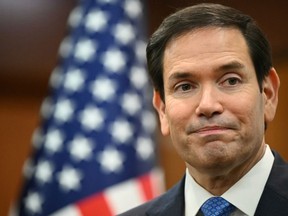
Contents of the article
WASHINGTON – Foreign Secretary Anita Anand says US Secretary of State Marco Rubio did not echo President Donald Trump's thoughts about making Canada the 51st state during his conversations.
Advertisement 2
Contents of the article
On Monday, Anand said Rubio “did not discuss this issue with me verbatim or even hint at it.”
Contents of the article
Contents of the article
She will meet Rubio and other G7 foreign ministers in Ontario's Niagara region on Tuesday and Wednesday to discuss shared economic and security concerns amid global uncertainty.
“We are on the playing field where we want to discuss the critical issues facing our countries and the world at large,” Anand said in an interview. “And we all, as G7 partners, come to the table in good faith to advance these important issues at a very volatile geopolitical moment.”
Relations between Canada and the United States have been strained by Trump's growing tariff agenda and threats of annexation.
Talk of Canadian sovereignty cast a shadow over the Group of Seven foreign ministers' meeting in March in Quebec, where Rubio told reporters Trump believed Canada should join the United States for “economic purposes.”
Contents of the article
Advertisement 3
Contents of the article
Rubio said at the time that the G7 meeting was not a meeting to discuss Trump's comments on annexation. But he noted that he had spoken with Melanie Jolie, Canada's then foreign minister, about the matter.
Trump himself avoided the “51st state” jibe when he spoke with Prime Minister Mark Carney while attending the G7 leaders' summit in Alberta in June. Carney told reporters at the time that the president showed respect for Canadian sovereignty.
The US State Department said on Monday that Rubio attended the G7 meeting to advance American interests in peace and security, strategic cooperation and global stability.
In a statement to the media, the department said Rubio's discussions will focus on “advancing President Trump's peace initiatives in Ukraine and Gaza, maritime security, Haiti, Sudan, supply chain resilience and critical minerals.”
Advertisement 4
Contents of the article
Carney tried to stabilize Canada's relationship with the United States and received widespread praise from the president during a meeting at the White House in October.
The positive glow did not last long. Trump again suspended talks with Canada last month after Ontario sponsored a television ad in which former US President Ronald Reagan criticized the tariffs.
Anand did not say whether she would discuss how to step up those talks with Rubio, adding that the trade deal is being led by Canadian-U.S. minister Dominic LeBlanc.
Anand said the G7 summit is a multilateral effort focused on a range of issues, from critical minerals and Arctic security to the Gaza Strip. She said the work must continue regardless of the “status of the trade.”
Advertisement 5
Contents of the article
“The relationship between Canada and the United States is extremely complex and has existed for decades,” Anand said. “We cannot ignore the number of issues on which the United States and Canada are working together.”
Canada, which holds the G7 presidency this year, has also decided to invite several other countries' foreign ministers to meetings this week. These include Australia, Brazil, India, Mexico, Saudi Arabia, South Korea, South Africa and Ukraine.
To reduce Canada's dependence on trade with the United States amid Trump's protectionism and tariffs, Carney and Anand are working to reset relations with India. These ties were quickly severed in 2023 after the assassination of Sikh leader Hardeep Singh Nijjar on Canadian soil.
Carney's efforts to restore relations with India met with some resistance. Human rights organization Sikhs For Justice says it plans to hold a 24-hour vigil during G7 meetings.
Anand said additional countries from different regions were included in the G7 summit to ensure a “live and useful inclusive conversation.”
Read more
Contents of the article









